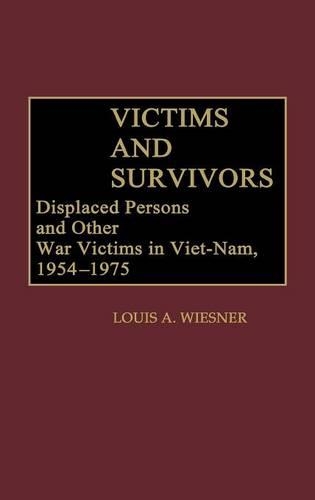
Victims and Survivors: Displaced Persons and Other War Victims in Viet-Nam, 1954-1975
(Hardback)
Publishing Details
Victims and Survivors: Displaced Persons and Other War Victims in Viet-Nam, 1954-1975
By (Author) Louis A. Wiesner
Bloomsbury Publishing PLC
Praeger Publishers Inc
8th December 1988
United States
Classifications
Tertiary Education
Non Fiction
959.704
Physical Properties
Hardback
478
Width 156mm, Height 235mm
851g
Description
The massive population displacements and generation of civilian war casualties that occurred between 1954 and 1975 disastrously weakened the fabric of South Vietnamese society, produced widespread demoralization, and contributed to the country's defeat by North Viet-Nam. This new work is the first systematic documentation of the human consequences of the Viet-Nam War. Based on American, Vietnamese, and international records, as well as a wealth of personal experience and eyewitness accounts, it examines the scope of the tragedy, what was done to cope with it, and what lessons can be drawn from the experience. Wiesner argues that the tragedy of the war itself was appreciably worsened by forced relocations and that this suffering could not have been relieved, because the amount of land on which the largely rural evacuees could be safely resettled was repeatedly diminished by Communist incursions and the demands of combat. Meanwhile, American bombing of the North, much less destructive to civilians than fighting and bombing in the South, was used by the totalitarian regime to instill hatred against the United States and its South Vietnamese ally. When in 1975 the North Vietnamese overran the entire South, masses of Vietnamese, for the first time in their history, fled from their country.
Reviews
"The definitive work on displaced persons, refugees and war victims during the course of the Vietnam War . . . a unique contribution to our understanding of that difficult and tragic period if, for no other reason, for its focus on the victims of the war itself."-Jerry M. Tinker, Staff Director, U.S. Senate Subcommittee on Immigration and Refugee Affairs
. . . Weisner's work illuminates one of the tragic ironies of Vietnam. A significant part of the suffering was inflicted on the South Vietnamese not by their adversaries but by their allies. He raises important human issues largely neglected in the debates over policy and strategy. The book thus breaks new ground in the literature on the Vietnam War.-Parameters
A decade after the US war in Vietnam ended, a thriving trade in books on the war flourishes. Although the majority of these works address the American wartime experience and the reasons for the US defeat, Wiesner's book seeks to assess the impact of the war on dislocated Vietnamese civilians. Such a humanitarian concern is a welcome contribution to the field. Because the policies that created wartime refugees--e.g., the strategic hamlet program and American combat presence--were so central to the failed war effort, any account of the refugee phenomenon quickly joins an often emotional debate about the politics of the war as a whole. . . . Weisner's account serves to remind its readership that the Vietnam War was lost, first and foremost, in the daily lives of Vietnamese civilians, not in the foibles of the American military. College, university, and public libraries.-Choice
A study of millions of uprooted and traumatized Vietnamese leads to vital conclusions about the effects of low-intensity war'.-Harvard Magazine
Although the majority of this book will appeal mainly to those with special interests in refugee/evacuee, issues, the value of lessons learned makes it essential reading for military leaders.-Military Review
." . . Weisner's work illuminates one of the tragic ironies of Vietnam. A significant part of the suffering was inflicted on the South Vietnamese not by their adversaries but by their allies. He raises important human issues largely neglected in the debates over policy and strategy. The book thus breaks new ground in the literature on the Vietnam War."-Parameters
"A study of millions of uprooted and traumatized Vietnamese leads to vital conclusions about the effects of low-intensity war'."-Harvard Magazine
"Although the majority of this book will appeal mainly to those with special interests in refugee/evacuee, issues, the value of lessons learned makes it essential reading for military leaders."-Military Review
"A decade after the US war in Vietnam ended, a thriving trade in books on the war flourishes. Although the majority of these works address the American wartime experience and the reasons for the US defeat, Wiesner's book seeks to assess the impact of the war on dislocated Vietnamese civilians. Such a humanitarian concern is a welcome contribution to the field. Because the policies that created wartime refugees--e.g., the strategic hamlet program and American combat presence--were so central to the failed war effort, any account of the refugee phenomenon quickly joins an often emotional debate about the politics of the war as a whole. . . . Weisner's account serves to remind its readership that the Vietnam War was lost, first and foremost, in the daily lives of Vietnamese civilians, not in the foibles of the American military. College, university, and public libraries."-Choice
Author Bio
LOUIS WIESNER, a retired Foreign Service officer, is an international authority on refugee assistance.
